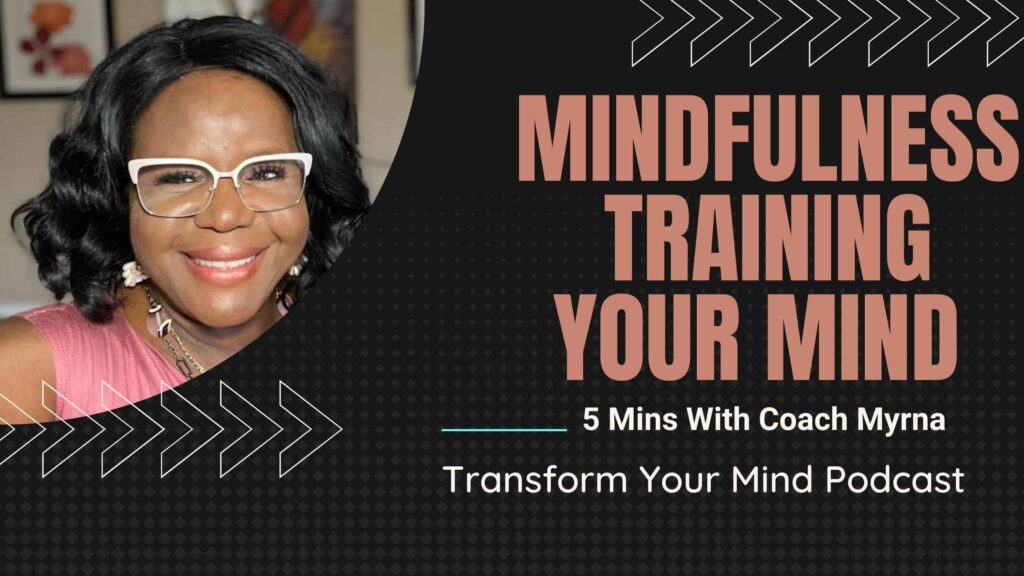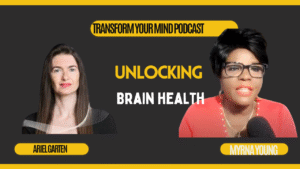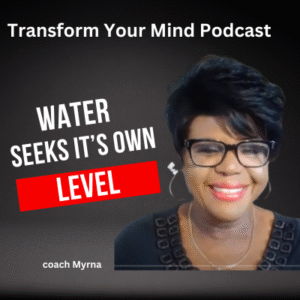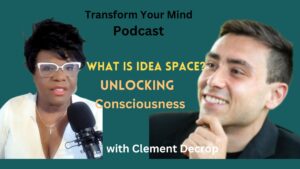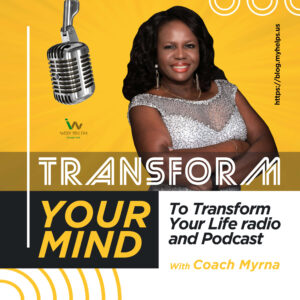Mindfulness exercises is the practice of training our minds to be, present, moment by moment. When we are, mindful, we are, conscious, of what is happening around us, our environment, our emotions, our reactions, etc. When we are fully, present, or practice, mindfulness, we listen rather than just hear, we perceive rather than just see. Mindfulness training affects everything we do and impacts every interaction we have with others.
In this episode of 5 mins with Coach Myrna, I teach on the topic of, Mindfulness exercises. Mindfulness, is the art of, being present. It is not as easy as it may seem to become, mindful. As humans we are controlled by automatic programming for over 95% of the time, so remembering to stay in the space of, mindfulness, is also saying to become more, conscious.
Download the podcast here
Why Practice with Mindfulness Exercises
Our minds are really good at shuffling between past, present and future, driven by our fears and desires, memories and imagination. Our minds habitually go from reflecting on the past one moment, to worrying about the future at the next moment, with very little time spent on being fully, present. This behavior is so habitual that we don’t even realize that we are not, present.
For some people, mindfulness, is primarily a way to enhance health or performance. For others, mindfulness, is a tool for self-exploration. And for yet others, mindfulness, is part of a spiritual path, a way to develop insight into the human condition and freedom from suffering.
Regardless of the motivation, scientists find that practicing, mindfulness, is associated with changes in the structure and function of the brain as well as changes in our physiological responses to stress, suggesting that this practice has important impacts on our physical and emotional health that are worth exploring.
How to Do Mindfulness
Mindful, action is connecting the body with the mind. Yoga is one way we connect our bodies and mind through movement to release stored stress and trauma. Mindful Breathing, is regulating our breathing to shift the way we feel, so we can better regulate our emotions.
Mindful Centering, is being aware of what you are thinking about as you think it. Becoming conscious of your thoughts and then using the breath to keep your focus in the, present moment. This allows you to center back in the, present, and breathe when the mind moves into the past or the future.
Focused attention is another, mindfulness, technique. This technique uses the breath to anchor the mind and maintain awareness. Focus your attention on the breath — specifically the rise and fall of the chest — and return to the breath whenever you get distracted or notice your, mind, starting to wander.
What is Mindfulness meditation
Mindfulness Meditation is an ancient Buddhist tradition that focuses on clearing your, mind, and stillness. You can think of, mindfulness meditation, as training for your, mind, in the same way exercise trains your physical body. Just as there are different workouts you can engage in to get your body fit, there are different types of, meditation, you can practice to sharpen your, mind. One of these types is, mindfulness meditation.
Like its name suggests, mindfulness meditation, involves becoming more mindful of the breath and the sensations in your body as you focus on your breathing. When thoughts come to the forefront of the, mind, you let them float away like colored balloons being taken away by the wind. You do not analyze the thoughts or let them take you into the past or the future, you simply let them come and go without being judgmental about them or trying to figure out what they mean.
Your goal is to become, mindful, of the, present moment, and how your body responds to these thoughts. This allows you to ultimately become less reactive to or overwhelmed by what you’re feeling — particularly when it comes to things like stress and anxiety.

Benefits of Mindfulness meditation
While, mindfulness exercises, may have once seemed like an esoteric practice that only monks or the highly spiritual did, it has now become mainstream. Everybody now knows of the measurable benefits of, meditation. Meditation, has undergone numerous clinical studies that are cluing scientists into the very real benefits this practice has. As it turns out, meditation, is officially great for your, mind and body.
When it comes to the science behind, meditation, different studies have investigated its relationship to a variety of different health conditions. While research remains ongoing, so far, there’s demonstrated evidence that, meditation, may promote an array of positive health effects, including:

- A natural reduction in pain levels
- Lower blood pressure in people who are at risk of developing high blood pressure
- “Help with psychological distress, anxiety, depression, anger/hostility and coping ability,” according to the U.S. Department of Health and Human Services
- Potential diminishing severity of irritable bowel syndrome symptoms after at least eight weeks of practice
- Improved sleep for people with insomnia
- Enhanced self-esteem
- Possible reduction of widespread body inflammation
- Better immune system functioning
On another practical level, mindfulness meditation, helps your body, including your nervous system relax.
How Mindfulness Meditation works
Mindfulness exercises don’t only change our, mindset, and perspective, it actually can change the shape of our brains. Generalized neuroimaging, meditation, studies found that 8 weeks of, mindfulness meditation, also changes our brains, rewiring them towards more positive thoughts and emotions.
Your ability to relax has a profound effect on your bodily functions, and the relaxation, meditation, leads to can lower your blood pressure, improve circulation and lowers your heart rate. You could see less perspiration, less strain in your breathing and lower levels of stress hormones in your body.
One of the biggest benefits of, mindfulness meditation, is mental. Being, mindful, can reduce your stress levels and anxiety and make you feel more relaxed. Regular, mindfulness meditation, becomes a tool you can use throughout your life to boost your mental and physical wellness.

Meditation Exercises as a spiritual practice
For many people, meditation is a spiritual practice. It can allow you to feel closer to God and more connected to your faith. This transcendent state feels otherworldly.
Meditation may also help kids learn to become more grounded and stable. You should begin practicing, mindfulness meditation, with your kids. Children benefit from the act of relaxing and concentrating. Practicing, mindfulness, can help them with their emotions, stress, anxiety, and feelings, just as it can for adults. Life is full of new feelings for children, and you may see an improvement in your child’s wellbeing after introducing, meditation.
People, meditate, for different reasons. While some do it as a religious practice, others practice for, self-development, a better sense of clarity, or just being still and hearing God. Many hope to feel more balanced and relaxed by lowering their stress levels. Whatever your reason, start by trying a few techniques to see which works best for you. Remember to give it time and have patience.
Many who start, mindfulness meditation, give up because they can’t quiet their minds, but like I said earlier a technique is to let the thoughts come and go, don’t fight them because the more you resist, the quicker they come back. With practice, you will be meditating like the, Buddhist monks, in no time.
Conclusion
So start your practice of being, mindful. Pay attention to your environment, the sensations in your body and start seeing the benefits.
Thanks for tuning into this week’s episode of 5 mins with coach Myrna. I invite you all to join my Facebook group called Lifecoach for daily life coaching tips and strategies to live your best lives now.

Additional Resources

